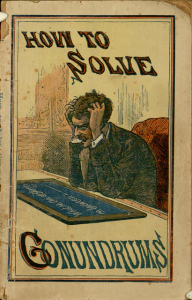This piece is the first in a series of what will be weekly (I hope!) posts on topics that relate to writer’s residencies. I am starting this post at Week 1, and counting up. Find Week 2 and Week 3 also on the blog.

CC image How to solve conundrums courtesy of Villanova University Digital Library on Flickr. Some rights reserved.
Ever been confronted with too many ways to achieve your goal, thereby paralyzing yourself as your choice swings from one, to the other, to the next possibility…?
That’s where I am right now.
I was awarded a four-week writer’s residency this summer. Short statement of fact: I am over the moon! Short statement of conundrum: I have a ton of work to do before signing in on the first day. I thought I had the next few months figured out, but now I’m not so sure. Because writing is, well, not always writing.
When I told one of the staffers at my writer’s workshop, a friend of mine, about my residency, he described what he did at his (shorter) residency last year. His approach was almost the complete inverse to what I’ve been planning.
I was planning to do my research first, and at the residency all I would do was write. The first draft.
He brought his completed first draft to the residency along with his research materials, and instead did the research and revision component to the first draft.
Both approaches have advantages. Under my plan, I’d have lots of information to work with — and then plenty of time to write. Using my friend’s strategy, I’d have the time to go over what I’d written, improve it, see where the gaps are, and then choose only that research which suits my needs.
Conundrum.
Why this is a big deal
Residencies are prized in the writing world. We get to spend uninterrupted time working on our projects! Hurrah! No need to go food shopping, or to work, or in fact to leave the house/building for any reason. Work in the middle of the night. Spread your notes out with abandon in your private studio. Hang out in said studio in your PJs. Nobody else comes in. That’s one REALLY big reason.
Residencies are a recognition of your work. Space is limited. I had to send a work sample with my application and jurors read it to decide whether it/me was worthwhile. Most applications are not accepted. Residencies are not publication, but a nod in that direction — yes, this work shows promise. My soul drinks this up, believe me.
A residency is not cheap. Consider that while in one sense you are taking a vacation from your regular life, your regular life (read: bills) doesn’t go away from you. It lies in wait. Plus, the residency program charges a fee, unless you receive a fellowship which covers your expenses. The fee is the second biggest hurdle to residencies after the application process (which is why I’ve set up a fundraising page).
Given that a) I was awarded a spot, b) I have a project to work on, and c) potential fundraising help… I really, really, REALLY want to make sure that my time there is well-spent. Which brings me to my conundrum.
Do I write during my writer’s residency?
It may seem obvious that a writer’s residency would be occupied with, you know, WRITING. However, Writing is more than just writing. Let me explain.
One part of Writing is the first draft. Most people are familiar with this process, which does, in fact, involve writing. The first draft is one of my options.
Another part of Writing is research. Both fiction and non-fiction may require this. Maybe you are writing about a botanist, as Liz Gilbert did in her recent novel, The Signature of All Things (note: on my to-read list). Liz Gilbert is not a botanist. She did a LOT of research in order to write that book. Liz wrote a book of fiction. You could also write a nonfiction book about a botanist. Research isn’t writing, though research is often necessary, and research takes time, organization, and at least a starting point for what information you need. I do need to do research at some point (my work is fiction).
Reviewing is a part of writing. For example, that first draft will need to be re-read. I’ll be taking notes on what is missing, wrong, inconsistent, or needs work. Also, what more research I probably need to do.
Overlapping with the review and extending onward is the long, wide prairie of Editing, often wracked by mysterious and destructive storms that reduce the work to rubble. Editing is quite a distance away from where I currently stand.
Then there is Re-writing, which might ally itself with Editing, or decide to rule on its own. Good-bye, first draft.
Bottom line: if you’re me, you have several months before four weeks of uninterrupted time to work on your project. What part of Writing is happening at the residency? What are you doing in those months beforehand?

